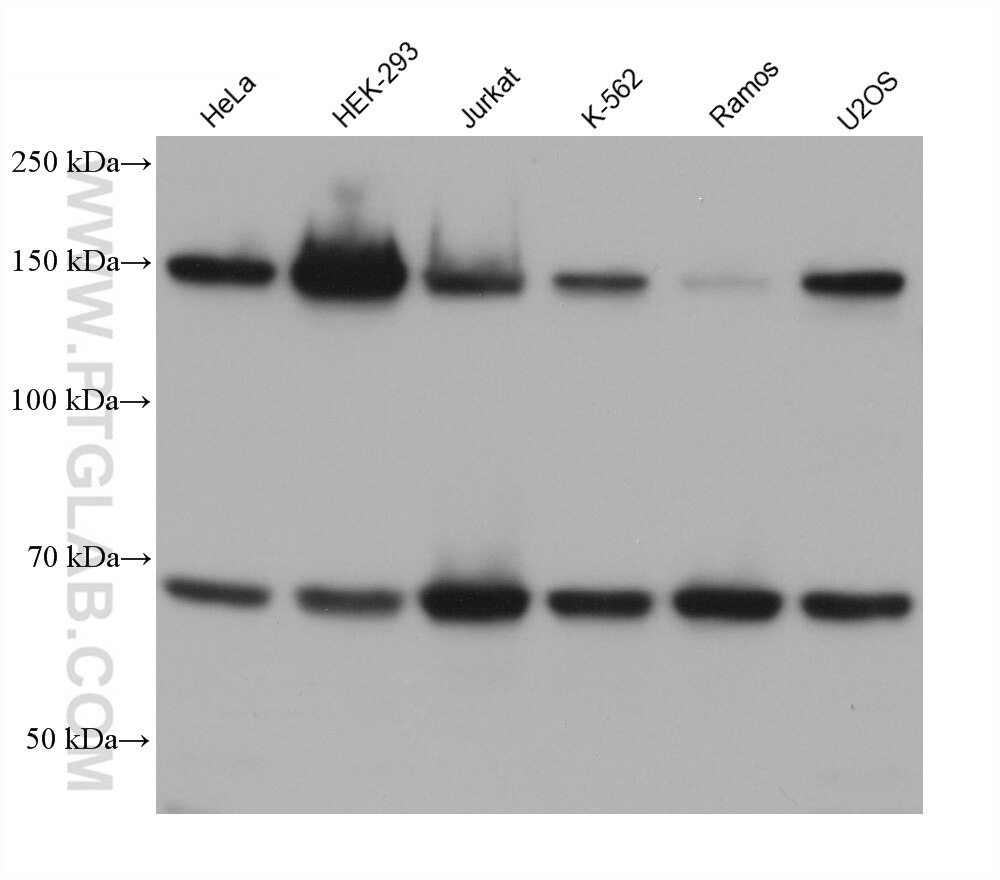NASP Monoklonaler Antikörper
NASP Monoklonal Antikörper für WB, ELISA
Wirt / Isotyp
Maus / IgG1
Getestete Reaktivität
human
Anwendung
WB, ELISA
Konjugation
Unkonjugiert
CloneNo.
1A1A1
Kat-Nr. : 68710-1-Ig
Synonyme
Geprüfte Anwendungen
| Erfolgreiche Detektion in WB | HeLa-Zellen, HEK-293-Zellen, Jurkat-Zellen, K-562-Zellen, Ramos-Zellen, U2OS-Zellen |
Empfohlene Verdünnung
| Anwendung | Verdünnung |
|---|---|
| Western Blot (WB) | WB : 1:5000-1:50000 |
| It is recommended that this reagent should be titrated in each testing system to obtain optimal results. | |
| Sample-dependent, check data in validation data gallery | |
Produktinformation
68710-1-Ig bindet in WB, ELISA NASP und zeigt Reaktivität mit human
| Getestete Reaktivität | human |
| Wirt / Isotyp | Maus / IgG1 |
| Klonalität | Monoklonal |
| Typ | Antikörper |
| Immunogen | NASP fusion protein Ag1824 |
| Vollständiger Name | nuclear autoantigenic sperm protein (histone-binding) |
| Berechnetes Molekulargewicht | 788 aa, 85 kDa |
| Beobachtetes Molekulargewicht | 150 kDa, 70 kDa |
| GenBank-Zugangsnummer | BC010105 |
| Gene symbol | NASP |
| Gene ID (NCBI) | 4678 |
| Konjugation | Unkonjugiert |
| Form | Liquid |
| Reinigungsmethode | Protein-G-Reinigung |
| Lagerungspuffer | PBS with 0.02% sodium azide and 50% glycerol |
| Lagerungsbedingungen | Bei -20°C lagern. Nach dem Versand ein Jahr lang stabil Aliquotieren ist bei -20oC Lagerung nicht notwendig. 20ul Größen enthalten 0,1% BSA. |
Hintergrundinformationen
NASP (nuclear autoantigenic sperm protein) is associated with DNA replication, cell proliferation and cell cycle progression through functioning as a Histone H1 binding protein that mediates histone transport to the nucleus. NASP had two isoforms, tNASP (testis type) and sNASP (somatic type). The tNASP was mainly expressed in testis, a variety of malignant tumors, stem cells and embryonic tissues, while sNASP existed in all somatic mitosis cells. This antibody can recognize both isoforms.
Protokolle
| PRODUKTSPEZIFISCHE PROTOKOLLE | |
|---|---|
| WB protocol for NASP antibody 68710-1-Ig | Protokoll herunterladen |
| STANDARD-PROTOKOLLE | |
|---|---|
| Klicken Sie hier, um unsere Standardprotokolle anzuzeigen |


